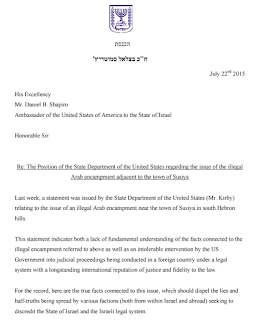Mordechai Kedar: How come America is Still "The Great Satan" in Iran?
Since the Iran Agreement does not provide a foolproof way to check that the Ayatollahs are definitely not developing nuclear arms, we can conclude that sooner or later Iran will develop nuclear weapons in secret, if it has not done so already. Nuclear weapons in the hands of the Ayatollahs pose a danger to the entire world because of the apocalyptic views of Shiite Islam and because of the Islamist ambition for global hegemony. Islamic religious tradition allows for the use of force and threats. Nuclear weapons will be a tool that allows the Ayatollahs to carry out their Shiite Islamist agenda and move on to control the world.Martin Sherman: The Iran deal – moronic, myopic, malevolent, mendacious
The only way to completely remove the danger of Iran's nuclear weapons is to abolish the rule of the Ayatollahs. Now that the world has done away with the economic sanctions weapon, there are only two ways left to achieve that goal: one, to encourage the young, secular adult majority to fight the regime and two, aid the minority groups in destabilizing the regime and undercutting its unity.
Iran's rulers are weak, afraid of the people, looking for outside enemies, lost in their own extremist rantings that are an attempt to hide their weaknesses. It would not be very difficult to overthrow the present regime. The moral justification for this is solid: the Ayatollah's have been undermining Lebanon's government since 1980 and recently, doing the same in Yemen. They supply arms, weapons and money to Assad, the mass murderer, and are largely responsible for the blood spilled in Iraq. They are behind terror worldwide, and have justly earned the world's desire to be rid of them and send them to a place where they cannot inflict any more damage on the human race. That, of course, would be the end of the Iranian nuclear weapons issue.
The questions that remain are straighforward. Does the world sees the dangers facing the world from the Iranian regime? Does it realize the real situation in Iran, the reality described in this article? And does the world have the courage to do what is needed to solve, in passing, the Iranian nuclear problem?
Of course if one wishes to see a durable, non-militarized solution to the Iranian crisis, perhaps the only conceivable avenue is regime change and installation of a more moderate, Western-oriented government.Jew vs. Jew (vs. Jew) on the Iran deal
But by greatly empowering and enriching the incumbent theocracy, the deal cut last week makes such a prospect incalculably more remote.
In the words of Saba Farzan, a German-Iranian journalist and director of a Berlin think tank, published in The Jerusalem Post: “The Vienna deal bears a very grave danger for Iran’s civil society. Not only won’t we see their economic situation improve, but the regime will also have an incentive to abuse human rights more severely. A flood of cash is going into the pockets of this leadership.
It will be used to tighten their grip [on power] and to further imprison, torture and kill innocent Iranians.”
She is, of course, right – and that is one of the greatest tragedies of the travesty concocted in Vienna last week.
The Jews of Israel oppose the agreement with Iran. The Jews of America support it. The just-released LA Jewish Journal survey turns an assumption into a fact: The two largest Jewish communities cannot agree on a major world development that could significantly change the state of the Jewish state.
Israel will discover today — much to many Israelis’ surprise (because they don’t much understand American Jews) — that it cannot count on the majority of American Jewry to fight the battle against the agreement alongside it. A majority of American Jews will discover today that amid all the noise made by opponents of the deal, not much has changed for them as a group: They support President Barack Obama; they vote Democratic; they approve of the agreement. American Jews are just like Americans, as sociologist Steven Cohen, who oversaw the survey, writes: They are all skeptical about the deal, but their politics dictate the way they ultimately see it.
There is one question that stands out in this poll as deserving the title “the most troubling.” That is, troubling for those who highly value the bond between Jewish communities. “Does the agreement make Israel safer or more endangered?” Cohen asked his Jewish-American respondents. And they have an answer for him: It endangers Israel.
So here, presumably, you have it all, encapsulated in one question: American Jews support the deal, even though they are skeptical about its outcome, and even though they understand that by supporting the deal, they contribute to making Israel less safe. (h/t Yenta Press)



































